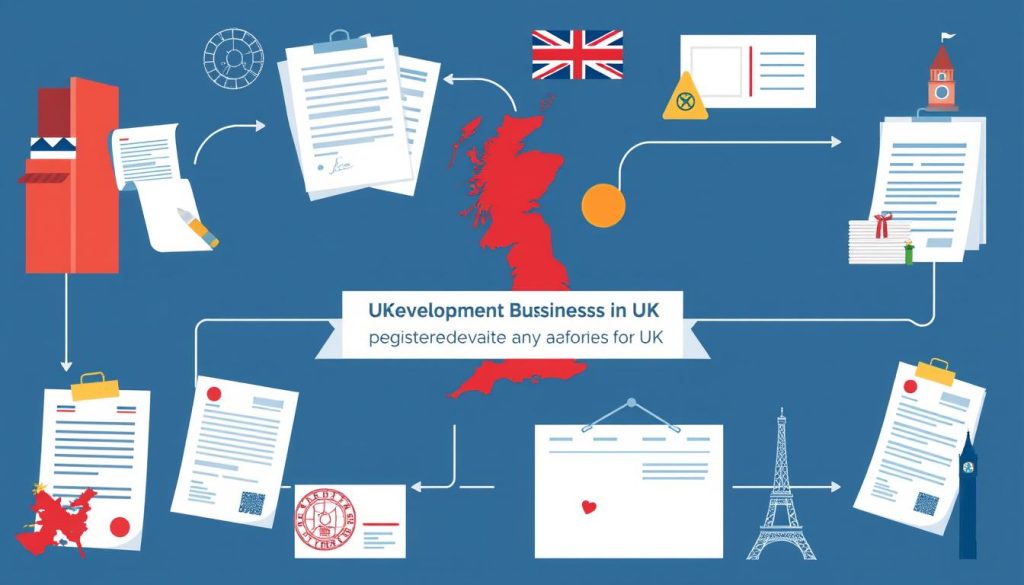Starting a web development business in the UK is an exciting venture. With technology growing and businesses needing online presence more than ever, web developers are in high demand. This creates a golden chance for enthusiasts looking to set up a digital agency in this vibrant market.
To start a web development business, you need to dive into several important areas. It’s vital to understand the local market, learn necessary skills, and know the legal stuff. Also, having a solid business and financial plan is key. This way, entrepreneurs can be competitive and offer great services in the web design scene in the UK.
Key Takeaways
- Understand the UK web development market before launching your business.
- Acquire essential technical and soft skills.
- Navigate legal requirements for establishing a digital agency.
- Develop a comprehensive business plan.
- Implement effective marketing strategies to attract and retain clients.
Understanding the Web Development Market in the UK
In the UK, the web development sector is growing fast. To keep up, it’s essential to know the latest trends and the competition. By analyzing competitors, we can spot chances to succeed and make strategies to reach our audience better.
Current Market Trends
Keeping up with trends is key to doing well in web development here. Lately, making sites mobile-friendly and developing e-commerce have become important. Many companies now see the need for a mobile-first strategy to meet what users expect. Also, there’s a big demand for web services made just for a client’s needs.
Key Competitors
A look at the competition shows some leading agencies and freelancers. Firms like Cyber-Duck, and freelance experts on Upwork and Fiverr, lead in many areas. Knowing what these competitors do well, and not so well, helps in planning our business moves. This way, we can find our own successful spot in this busy market.
Target Audience
Finding who to target is vital for web development firms. Small and large businesses, along with niche markets wanting custom digital services, are our main clients in the UK. By offering exactly what these groups need, we can make our clients happy and grow our business. Knowing our audience means we can be more effective and efficient in our work.
Essential Skills and Knowledge for Web Developers
For anyone dreaming of being a web developer, having the right skills is crucial. We will look into the important technical and soft skills needed. It is also essential to keep learning to stay ahead in the web development game.
Technical Skills
Being great at web development starts with technical knowledge. Knowing programming languages like HTML, CSS, and JavaScript is basic. It’s also good to be familiar with frameworks such as React, Angular, Vue.js, and content management systems like WordPress and Joomla. Understanding how to make websites work well on different devices is important too.
Soft Skills
Soft skills are just as vital as technical abilities for web developers. Good communication helps turn client needs into working websites. Being able to solve problems quickly is key. Teamwork also plays a big role in finishing projects well and on time.
Ongoing Learning and Development
The tech world changes fast, so developers must keep learning. Staying up to date with new trends and skills is a must. Taking online courses, joining workshops, and attending webinars help keep skills sharp. This continuous effort helps developers grow in this fast-paced industry.
Setting Up Your Business Legally

Starting a web development business in the UK involves legal steps. You must understand the UK business structures, register your company, and follow startup laws. These steps are crucial for your business journey.
Business Structure Options
Choosing the right UK business structure affects your risks and taxes. The main types are:
- Sole Trader
- Partnership
- Limited Company
Each option has benefits and drawbacks. Think about liability and taxes to match your business needs.
Registering Your Business
To register, pick a unique name. Then, sign up with Companies House and HM Revenue & Customs. It’s vital for your business’s legal identity and tax duties.
By registering, your business is legally recognized. This lets you work under UK law.
Compliance and Legal Requirements
Legal compliance means following specific rules. These include data safety, copyright laws, and sector-related laws. Knowing these helps lower risks and keeps your business running smoothly.
Keep up with new legal and compliance changes. It’s key for your web development business to grow and succeed in the UK.
Creating Your Business Plan
A well-crafted business plan is key to success. It acts as a map, showing the way from start to expansion. It makes sure company goals are clear. This guide will help you with each key part of creating your plan.
Defining Your Vision and Mission
The vision and mission give your plan its foundation. They state what you aim for in the long run and your business’s main goal. Starting with clear goals not only guides everyday tasks but also helps with making important choices.
Market Analysis
It’s critical to do deep market research. You need to understand your industry, who your rivals are, and who you’re selling to. Spotting trends also helps. Good market analysis spots chances and risks, which helps with smart planning.
Financial Projections
Getting your financial forecasts right is essential. You should account for income, spending, and profit for a certain time. These forecasts have two big roles: they set money goals and show investors your business can succeed.
Financial Management for Start-ups
Effective financial management is key for start-up success, including web development firms. This guide offers insights into budget planning, startup funding options, and cash flow management.
Budgeting and Forecasting
Having a detailed budget and forecasting finances are the first steps for start-ups. By knowing all expenses, you can create a budget that meets your goals. Also, forecasting helps predict future money needs, improving budget planning and growth.
Funding Options
Finding the right startup funding can be tough. There are many sources like savings, bank loans, angel investors, and venture capitalists. Each has its own advantages. Choosing the best option for your business ensures constant funding during growth.
Managing Cash Flow
Good cash flow management lets your business pay short-term bills and keep money for surprises. Practices like regular cash review, having a cash reserve, and managing debts and credits can boost your finances.
Following these financial management practices helps start-ups build a strong financial base. This allows them to confidently tackle business challenges.
Building Your Portfolio
Building a strong web development portfolio is key for getting clients and impressing future employers. It should show a wide range of projects, highlighting your skills. This shows your ability to tackle different challenges.
Make sure your portfolio shows many examples of your skills in solving client issues. A good set of projects shows your wide abilities to potential clients. This helps them see what you can do.
A good web development portfolio includes project screenshots and detailed summaries. These summaries explain the project goals, the tech used, and what was achieved. Providing these details helps show off your problem-solving skills and tech knowledge to attract clients.
Adding client testimonials to your portfolio can boost its value. Positive reviews increase your portfolio’s trustworthiness. They act as a real stamp of approval for your skills and dependability.
Keeping your portfolio up-to-date is very important. As you finish new projects, switch out the old ones. This keeps your portfolio fresh. It accurately shows your growing skills. And it keeps clients interested over time.
- Include a variety of projects to demonstrate diverse skills.
- Add project descriptions to provide context and insights.
- Incorporate client testimonials to build trust and credibility.
- Regularly update your portfolio with recent work.
Your web development portfolio is more than just work samples. It’s a vital tool for attracting clients and pushing your business forward. With careful preparation, it can play a huge role in your success.
Networking and Building Professional Relationships
Building strong professional ties is key for your career in web development. Networking can lead to new partnerships, clients, and insights into the industry. Here’s how you can establish these important connections.
Attending Industry Events
Going to industry events is fundamental for networking. These events let you meet colleagues, potential clients, and industry leaders. Web Summit and the Future of Web Design are great places to showcase your skills, exchange ideas, and stay updated on web development trends.
Joining Professional Associations
Joining bodies like the British Computer Society (BCS) boosts your professional image. They provide access to exclusive resources, certification schemes, and networking platforms. Being part of such associations shows your dedication to professional growth and commitment to industry standards.
Leveraging Social Media
Using social media is crucial for forming professional relationships today. LinkedIn, for example, lets you connect with fellow web developers, showcase your work, and join in on conversations that broaden your industry knowledge. By posting regularly, sharing important content, and being active in groups, you can increase your visibility and attract new clients.
Pricing Your Web Development Services
Setting the right prices for your web services is about knowing the market and strategizing. This section will help you look into market prices, set fair prices, and use discounts to get and keep clients.
Researching Market Rates
First, understand what others charge for web services. Look at what UK web developers are charging to align your prices with industry norms. Check out freelance sites, corporate sites, and industry reports for a broad view.
Setting Competitive Prices
Knowing the market rates, you can then price your work to be competitive yet worth the effort and quality you provide. Using methods like value-based, time-based, and project-based pricing helps. It ensures you get fair pay for your skills and hard work.
Offering Packages and Discounts
Offering bundle discounts is smart for attracting new clients and building lasting relations. Create tiered service packages, from basic to all-in-one solutions. Also, give special discounts or promotions to boost business in slow times and keep clients happy.
With these pricing strategies, web devs can be competitive and still make a profit while keeping clients satisfied.
Marketing Your Web Development Business

Marketing well is key to your web development business doing well, particularly in the UK’s tough market. Using different digital marketing strategies can get you noticed by potential clients. This helps build a strong brand and trust in the industry.
Digital Marketing Strategies
Good digital marketing can set your business apart. Using email marketing, PPC advertising, and other digital methods can target your audience well. You can see how well your campaigns do instantly. Getting your name out there with online ads and emails keeps clients thinking of you.
Content Marketing
Share great content to stand out as a leader in your field. Post blogs, case studies, whitepapers, and video tutorials to show off your web development skills. Good content captures your audience and boosts your site’s SEO by adding more keywords linked to your brand. Sharing your knowledge through content helps gain trust and turns leads into clients.
SEO and Social Media Marketing
SEO makes your website more visible on search engines. Using the right keywords, meta tags, and backlinks improves your ranking and brings more visitors. Social media also expands your reach. Use LinkedIn, Facebook, and Twitter to connect with clients, share news, and promote your content. Social media lets you talk directly to your audience, building better relationships and getting feedback.
By mixing these digital and content marketing strategies, SEO, and social media, you can make a strong mark in the web development world and keep clients coming.
Start a Web Development Business: Step-by-Step Guide
Starting a web development business requires careful thought and steady action. This guide outlines the steps to take, from the start to growth. It’s about planning well, taking the right steps, and growing your business smartly.
Initial Planning
First steps are key. You need to research the market to see where demand is. Find your special area. Plan your goals and make a strong business plan. Include these things:
- Mission and vision statements
- Detailed market analysis
- Financial projections and budgets
- Strategies for client acquisition
Execution Phase
After planning, start doing. Make your brand known, build a great website, and get clients with good marketing. Do these things:
- Register your business and make it legal
- Show off your skills with a great portfolio
- Use SEO and marketing to be seen more
- Network and build business relationships
Growth and Scaling
Once your start-up is running, think about growing. Improve how you work, offer more, and reach new places. Here are some steps:
- Hire talented developers for more skills
- Provide better web solutions and services
- Move into new areas or sectors
- Keep improving your business plan
Follow these stages carefully, and your web development start-up can succeed. Focus on planning, executing well, and growing wisely. This way, you can build a successful web development business in the UK.
Building an Effective Website for Your Business
An effective business website is key to having a strong online brand. It should show what your brand is all about. It should also be easy for users to get around. Let’s look at what makes a website work well for showing potential clients what you can do.
First, think about the user experience. A site that’s simple to use means people can find what they need fast. This includes easy-to-understand menus, quick loading times, and clear steps for the user to take next.
Content clarity is also vital. Your content needs to be exciting, well-planned, and without complicated terms. Good content helps showcase your services. It also improves your search engine ranking, making your site easier to find.
Mobile responsiveness is crucial too. More people now use mobiles to go online, so your site must work well on all devices. A responsive site makes for a better user experience. It also means people are less likely to leave your site quickly, helping your brand’s online look.
Last but not least, the design matters. A well-designed site shows you are professional and trustworthy. Choose a design that fits your brand to draw in and keep customers.
An effective business website mixes a good user experience, engaging content, mobile-friendly design, and visual appeal. This combination will boost your brand online. It’s a great way to catch the eye of future clients.
Choosing the Right Tools and Technologies

It’s vital to pick the right web development tools and technologies. This boosts efficiency and product quality in projects. We’ll look into development frameworks, project management tools, and testing solutions. These help streamline work and ensure the projects meet quality standards.
Development Frameworks
Frameworks speed up coding and help create strong web apps. React.js, Angular, and Vue.js are popular choices. They make it easier to build dynamic web interfaces. These frameworks boost speed and improve how well different parts of the web work together.
Project Management Tools
Good project management is key to success in web development. Tools like Jira, Trello, or Asana improve team work and make things run smoother. They keep track of progress, help meet deadlines, and make sure everyone is on the same page.
Testing and Debugging Tools
Testing and debugging ensure web apps are of the highest quality. Selenium, Jest, and Postman are vital for checking functions and finding errors. These tools are crucial for quality assurance. They help make sure the final product is up to client and industry standards.
Offering Exceptional Customer Service
Delivering top-notch customer service sets your web development business apart. It’s vital to understand what clients need, communicate effectively, and handle feedback well. This ensures they’re satisfied and more likely to return.
Understanding Client Needs
Meeting client expectations starts with a deep dive into their needs. Through detailed talks, gather key info on their goals and what they prefer. This base leads to custom solutions that make clients happy.
Effective Communication
Clear communication keeps client relationships strong. Keeping clients updated and answering their questions quickly builds trust. Using emails, online meetings, and project tools helps keep everyone on the same page.
Handling Feedback and Complaints
Good feedback management is crucial. Actively asking for feedback shows areas to improve. Handling complaints professionally and kindly is a must. Prompt solutions show you care, building loyalty and a strong service reputation.
Scaling Your Web Development Business
As your web development business grows, thinking about how to scale effectively is important. You can expand by hiring skilled developers, offering more services, and looking into new markets.
Hiring Talented Developers
Finding developers with the right skills and experience is key. Look for people who fit well with your company culture as well. Giving new staff a good start and ongoing training makes sure your team stays sharp and motivated.
Expanding Your Services
Diversifying services is also essential for growth. Think about adding services like mobile app development and user experience design. This broadens your client base and opens up new ways to make money. Being able to offer everything clients need positions your business as a top choice.
Entering New Markets
To speed up growth, consider entering new markets. Do your research to understand what these markets need and who else is offering similar services. Adapting your marketing and services to fit the needs of new markets can give your business an edge.
Focus on hiring the right people, broadening your services, and venturing into new markets. Doing these things will help your web development business grow sustainably and successfully.
Keeping Up with Industry Trends
Web development is always changing, making it vital to keep up to maintain an edge. By adopting new technologies, your business can offer innovative solutions and stay relevant. It’s essential in a market that moves quickly.
Knowing about future trends helps you spot new opportunities and changes. Read reputable publications, go to tech events, and join webinars to keep informed. Talking to experts on LinkedIn can also boost your knowledge of what’s coming.
Learning doesn’t stop for top web developers. They improve their skills through online courses, certificates, and workshops. This commitment to learning keeps their work fresh and innovative.











